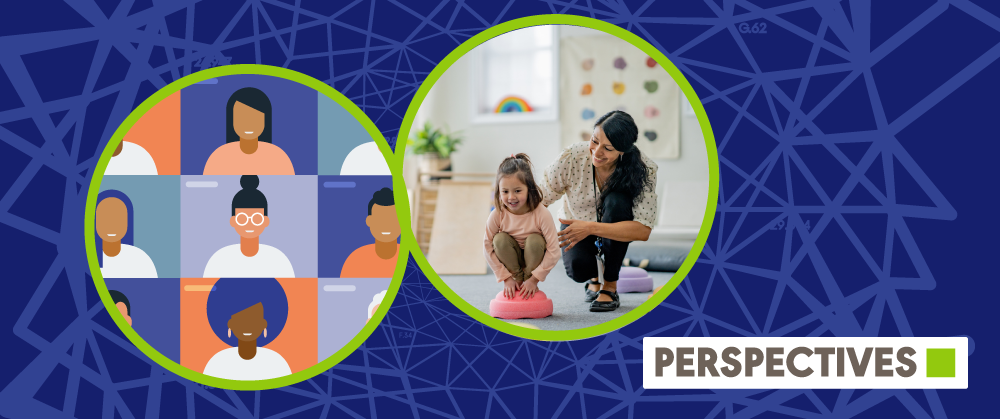If your New Year’s resolution includes incorporating more evidence-based practice into your work, we’ve got some good news for you! The latest issue of Perspectives of the ASHA Special Interest Groups contains two forums on topics in language learning and education—key for speech-language pathologists (SLPs) who work with children in schools and clinics. Even better, you can read both forums for free for the next 2 weeks!
ADHD, DLD, and the Speech-Language Pathologist
Perspectives’ first issue of the year opens with two forums from Special Interest Group (SIG) 1, Language Learning and Education. The first from Guest Editor Sean Redmond offers information for SLPs working with children with attention-deficit/hyperactivity disorder (ADHD) and/or developmental language disorder (DLD).
First, Timler and colleagues provide SLPs with best practice guidelines to support the social–emotional development of students with ADHD and/or DLD. Manley and Wilder showcase key accommodations that SLPs can make in the clinic to enhance the effectiveness of their sessions for these students.
Next, Hannig Russell and Redmond show how SLPs can collaborate with other professionals to support students with ADHD and DLD who are at increased risk for behavioral and academic problems. In the final article of the forum, Watson and Westby examine the unique difficulties of assessing both ADHD and DLD in multilingual children.
Promoting Social Justice in Education
After that, Guest Editor R. Danielle Scott presents the first part of a forum centered on bringing social justice to your work in education. In her introduction to the forum, Scott writes that ASHA members often work with members of marginalized populations and that social justice is necessary to dismantle barriers to communication access.
After the introduction, Privette and Saechao look at Black language in schools from a translanguaging approach, suggesting that students should be able to speak in the dialect they prefer. Next, Saechao, Privette, and Kim provide a case study demonstrating this approach in action, showing how to support nonspeaking students in using languages and dialects they choose.
Helm and Selin review the conversational language profile of children from low socioeconomic environments, highlighting how SLPs can avoid over-identifying this group as having language disorders. In the final article of the forum, Scott guides school-based SLPs in using cultural humility when collaborating on goals and tasks in therapy.
. . . and Even More For Clinicians!
The February issue of Perspectives also contains 17 additional articles for ASHA members working in a variety of settings. If you’re looking for more free articles from Perspectives, check out our updated Free Sample Articles, spanning all the areas that the journal covers.
We’d like to thank Drs. Redmond and Scott for their work bringing these forums to Perspectives. You can read the February issue online, or explore the individual articles in the forums below.
Explore The Forums
ADHD and the Speech-Language Pathologist: Accommodations, Integrations, and Collaborations
Hannig Russell, K. M., & Redmond, S. M. (2025). The impacts of co-occurring developmental language disorder on the academic, interpersonal, and behavioral profiles of children with attention-deficit/hyperactivity disorder. Perspectives of the ASHA Special Interest Groups, 10(1), 29–43. https://doi.org/10.1044/2024_PERSP-24-00035
Manley, N. R., & Wilder, A. (2025). Clinical accommodations for children with co-occurring developmental language disorder and attention-deficit/hyperactivity disorder. Perspectives of the ASHA Special Interest Groups, 10(1), 18–28. https://doi.org/10.1044/2024_PERSP-24-00076
Timler, G. R., Zane, E., Decker, E. L., Ritter, R., & Stewart, A. (2025). Best practices for supporting social–emotional development in children with developmental language disorder and attention-deficit/hyperactivity disorder. Perspectives of the ASHA Special Interest Groups, 10(1), 1–17. https://doi.org/10.1044/2024_PERSP-24-00088
Watson, S., & Westby, C. (2025). Multilingual lingual learners with attention-deficit/hyperactivity disorder and developmental language disorder: Assessing an underserved population of learners. Perspectives of the ASHA Special Interest Groups, 10(1), 44–60. https://doi.org/10.1044/2024_PERSP-24-00034
With Liberty and Social Justice for All: Part 1
Helm, K., & Selin, C. (2025). The conversational language profile of children in low socioeconomic environments: A systematic review. Perspectives of the ASHA Special Interest Groups, 10(1), 88–106. https://doi.org/10.1044/2024_PERSP-23-00299
Privette, C., & Saechao, K. R. (2025). Black languaging IS translanguaging: We not just talkin bout it, we bout it bout it! Perspectives of the ASHA Special Interest Groups, 10(1), 64–73. https://doi.org/10.1044/2024_PERSP-23-00297
Saechao, K., Privette, C., & Kim, J. (2025). Translanguaging in AACtion: An expansive approach to multimodal communication with augmentative and alternative communication users. Perspectives of the ASHA Special Interest Groups, 10(1), 74–87. https://doi.org/10.1044/2024_PERSP-23-00298
Scott, R. D. (2025a). Introduction to the forum: With liberty and social justice for all, Part I. Perspectives of the ASHA Special Interest Groups, 10(1), 61–63. https://doi.org/10.1044/2024_PERSP-24-00164
Scott, R. D. (2025b). Keepin’ it real with relationships: Cultural humility and therapeutic relationships with culturally/linguistically diverse students. Perspectives of the ASHA Special Interest Groups, 10(1), 107–122. https://doi.org/10.1044/2024_PERSP-23-00301







